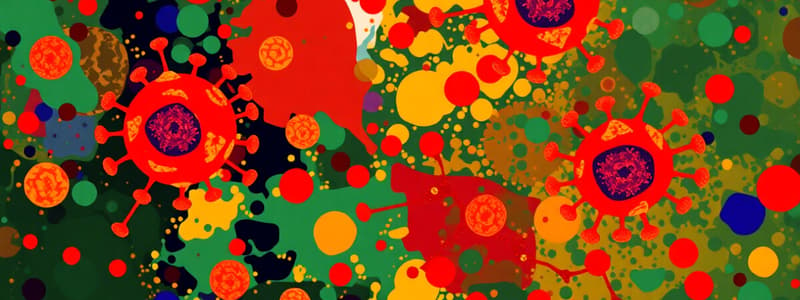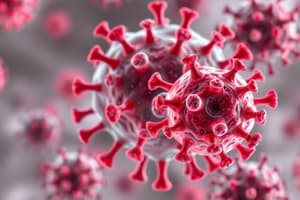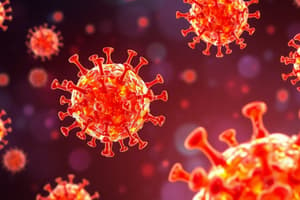Podcast
Questions and Answers
Following a subcutaneous injection of turpentine, which of the following best describes the response in wildtype mice?
Following a subcutaneous injection of turpentine, which of the following best describes the response in wildtype mice?
- Suppressed glucocorticoid induction and no fever.
- No change in acute phase proteins and suppressed glucocorticoid induction.
- Reduced acute phase proteins and no fever.
- Development of fever and acute phase proteins. (correct)
What was observed in IL-1β-deficient mice after turpentine injection?
What was observed in IL-1β-deficient mice after turpentine injection?
- Suppressed glucocorticoid induction and no fever. (correct)
- Normal induction of glucocorticoids and development of fever.
- No change in either glucocorticoids or fever response.
- Development of fever and acute phase proteins.
In IL-1α-deficient mice, how was the expression of IL-1β mRNA in the brain affected?
In IL-1α-deficient mice, how was the expression of IL-1β mRNA in the brain affected?
- No change observed in IL-1β mRNA levels.
- Decreased by 1.5-fold. (correct)
- Decreased by 30 fold.
- Increased by 30 fold.
What effect does IL-1β deficiency have on IL-1α mRNA expression?
What effect does IL-1β deficiency have on IL-1α mRNA expression?
What is the suggested relationship between IL-1β and IL-1α production?
What is the suggested relationship between IL-1β and IL-1α production?
Which of the following is NOT a mechanism that activates cytokines besides caspase-1?
Which of the following is NOT a mechanism that activates cytokines besides caspase-1?
What is an observed effect of sterile inflammation?
What is an observed effect of sterile inflammation?
Which type of cell releases the IL-1β precursor due to it's short life span?
Which type of cell releases the IL-1β precursor due to it's short life span?
What is the effect in mice deficient in IL-1β when challenged with a subcutaneous injection of turpentine?
What is the effect in mice deficient in IL-1β when challenged with a subcutaneous injection of turpentine?
Besides Proteinase-3, which other proteases process the IL-1β precursor extracellularly?
Besides Proteinase-3, which other proteases process the IL-1β precursor extracellularly?
What is the conserved consensus sequence found in the precursors of the proteins discussed?
What is the conserved consensus sequence found in the precursors of the proteins discussed?
What is the N-terminal amino acid's role in these proteins?
What is the N-terminal amino acid's role in these proteins?
What is the effect of truncating IL-36α, IL-36β, and IL-36γ to the 9th amino acid before the A-X-D motif?
What is the effect of truncating IL-36α, IL-36β, and IL-36γ to the 9th amino acid before the A-X-D motif?
Neutralization of IL-1β using monoclonal antibodies has demonstrated its role in which of the following?
Neutralization of IL-1β using monoclonal antibodies has demonstrated its role in which of the following?
How many members are there in the IL-1 family of receptors?
How many members are there in the IL-1 family of receptors?
Which of the options correctly describes the formation of the signaling complex in this pathway?
Which of the options correctly describes the formation of the signaling complex in this pathway?
How does IL-1β affect its own levels?
How does IL-1β affect its own levels?
What effect does LPS stimulation have on IL-1β mRNA levels in human blood monocytes initially?
What effect does LPS stimulation have on IL-1β mRNA levels in human blood monocytes initially?
What is the role of the TIR domains in the signaling complex?
What is the role of the TIR domains in the signaling complex?
What is the immediate consequence of MyD88 binding to the TIR domains?
What is the immediate consequence of MyD88 binding to the TIR domains?
How does IL-1 stimulation differ from microbial stimulants with respect to IL-1β mRNA levels?
How does IL-1 stimulation differ from microbial stimulants with respect to IL-1β mRNA levels?
In which form does IL-1β accumulate initially in the cytosol before activation?
In which form does IL-1β accumulate initially in the cytosol before activation?
Which statement is true about the interaction between ligands and receptors involved?
Which statement is true about the interaction between ligands and receptors involved?
What is a major effect of specific caspase-1 inhibitors on IL-1β in monocytes and macrophages?
What is a major effect of specific caspase-1 inhibitors on IL-1β in monocytes and macrophages?
What is commonly defined as the rate-limiting step in the processing and secretion of IL-1β?
What is commonly defined as the rate-limiting step in the processing and secretion of IL-1β?
What is another name for the intracellular protein complex that contains NLRP3?
What is another name for the intracellular protein complex that contains NLRP3?
Which cytokine has been found to be elevated in the postictal period in patients with recurrent seizures?
Which cytokine has been found to be elevated in the postictal period in patients with recurrent seizures?
In studies of patients with recurrent temporal lobe epilepsy, when was elevated IL-1β observed?
In studies of patients with recurrent temporal lobe epilepsy, when was elevated IL-1β observed?
What condition has been treated with anakinra and resulted in a cessation of seizures?
What condition has been treated with anakinra and resulted in a cessation of seizures?
Anakinra is primarily used to treat macrophage activation syndrome (MAS) in patients with which primary condition?
Anakinra is primarily used to treat macrophage activation syndrome (MAS) in patients with which primary condition?
In a re-analysis of a septic shock trial, which of the following was NOT identified as a feature of macrophage activation syndrome (MAS)?
In a re-analysis of a septic shock trial, which of the following was NOT identified as a feature of macrophage activation syndrome (MAS)?
In the study analyzing anakinra treatment for MAS in septic shock patients, what was the approximate percentage of patients with concurrent hepatobiliary dysfunction/disseminated intravascular coagulation?
In the study analyzing anakinra treatment for MAS in septic shock patients, what was the approximate percentage of patients with concurrent hepatobiliary dysfunction/disseminated intravascular coagulation?
According to the study, what was the hazard ratio for death in the group treated with anakinra compared to the placebo group?
According to the study, what was the hazard ratio for death in the group treated with anakinra compared to the placebo group?
What was the survival rate at 28 days in the anakinra treated group compared to the placebo group in the septic shock study?
What was the survival rate at 28 days in the anakinra treated group compared to the placebo group in the septic shock study?
What is the primary role of IL-18 in the absence of IL-12 or IL-15?
What is the primary role of IL-18 in the absence of IL-12 or IL-15?
Which factor is necessary for the release of membrane-bound IL-18 from M-CSF-primed macrophages?
Which factor is necessary for the release of membrane-bound IL-18 from M-CSF-primed macrophages?
What is one way that IL-18 differs from IL-1 in cellular activation levels?
What is one way that IL-18 differs from IL-1 in cellular activation levels?
What is the role of IL-12 or IL-15 in IL-18 signal transduction?
What is the role of IL-12 or IL-15 in IL-18 signal transduction?
Which immune cell is primarily targeted by IL-18 for IFN-γ induction?
Which immune cell is primarily targeted by IL-18 for IFN-γ induction?
Which of the following is NOT a disease associated with elevated levels of both IFN-γ and IL-18?
Which of the following is NOT a disease associated with elevated levels of both IFN-γ and IL-18?
What is the approximate percentage of M-CSF primed macrophages that express membrane IL-18?
What is the approximate percentage of M-CSF primed macrophages that express membrane IL-18?
After the formation of a heterodimer, what is the next event in the signaling pathway?
After the formation of a heterodimer, what is the next event in the signaling pathway?
Flashcards
IL-1α and turpentine-induced fever
IL-1α and turpentine-induced fever
Following subcutaneous injection of turpentine, both wildtype and IL-1α-deficient mice experience fever and acute phase protein production. This suggests IL-1α is not essential for these responses.
IL-1β's role in fever and glucocorticoid production
IL-1β's role in fever and glucocorticoid production
While IL-1β-deficient mice fail to develop fever and exhibit suppressed glucocorticoid production, IL-1α-deficient mice do not show these limitations. This indicates IL-1β plays a crucial role in these responses.
IL-1β's influence on IL-1α
IL-1β's influence on IL-1α
In IL-1β-deficient mice, IL-1α mRNA expression significantly decreases, suggesting IL-1β might influence IL-1α production. Conversely, IL-1α deficiency only modestly affects IL-1β mRNA levels.
Caspase-1 and IL-1α production
Caspase-1 and IL-1α production
Signup and view all the flashcards
IL-1β's discovery and significance
IL-1β's discovery and significance
Signup and view all the flashcards
A-X-D motif
A-X-D motif
Signup and view all the flashcards
Caspase-1 cleavage site in IL-1β
Caspase-1 cleavage site in IL-1β
Signup and view all the flashcards
N-terminus of IL-1 cytokines
N-terminus of IL-1 cytokines
Signup and view all the flashcards
MyD88
MyD88
Signup and view all the flashcards
IL-1 family receptors
IL-1 family receptors
Signup and view all the flashcards
Trimeric signaling complex
Trimeric signaling complex
Signup and view all the flashcards
TIR domain
TIR domain
Signup and view all the flashcards
NFκB
NFκB
Signup and view all the flashcards
Toll-like Receptors (TLRs)
Toll-like Receptors (TLRs)
Signup and view all the flashcards
Interleukin-1β (IL-1β)
Interleukin-1β (IL-1β)
Signup and view all the flashcards
Protein Processing
Protein Processing
Signup and view all the flashcards
NLRP3 Inflammasome
NLRP3 Inflammasome
Signup and view all the flashcards
Caspase-1
Caspase-1
Signup and view all the flashcards
Protein Synthesis
Protein Synthesis
Signup and view all the flashcards
Ligand
Ligand
Signup and view all the flashcards
Stimulant
Stimulant
Signup and view all the flashcards
Proteinase-3
Proteinase-3
Signup and view all the flashcards
Sterile Inflammation and IL-1β activation
Sterile Inflammation and IL-1β activation
Signup and view all the flashcards
IL-1β-deficient mice
IL-1β-deficient mice
Signup and view all the flashcards
Neutrophils and IL-1β
Neutrophils and IL-1β
Signup and view all the flashcards
Elastase
Elastase
Signup and view all the flashcards
Macrophage activation syndrome (MAS)
Macrophage activation syndrome (MAS)
Signup and view all the flashcards
Systemic juvenile idiopathic arthritis (sJIA)
Systemic juvenile idiopathic arthritis (sJIA)
Signup and view all the flashcards
Adult-onset Still's disease (AOSD)
Adult-onset Still's disease (AOSD)
Signup and view all the flashcards
Anakinra
Anakinra
Signup and view all the flashcards
Febrile infection-related epilepsy (FIRE) syndrome
Febrile infection-related epilepsy (FIRE) syndrome
Signup and view all the flashcards
Temporal lobe epilepsy
Temporal lobe epilepsy
Signup and view all the flashcards
Postictal period
Postictal period
Signup and view all the flashcards
Intracellular ictal period
Intracellular ictal period
Signup and view all the flashcards
IL-18's role in Th1 response
IL-18's role in Th1 response
Signup and view all the flashcards
IL-18's role in Th2 disease
IL-18's role in Th2 disease
Signup and view all the flashcards
IL-18's effect on NK cells
IL-18's effect on NK cells
Signup and view all the flashcards
IL-18 release from macrophages
IL-18 release from macrophages
Signup and view all the flashcards
IL-18's role in autoimmune diseases
IL-18's role in autoimmune diseases
Signup and view all the flashcards
IL-18 signaling pathway
IL-18 signaling pathway
Signup and view all the flashcards
IL-18Rβ in signaling
IL-18Rβ in signaling
Signup and view all the flashcards
IL-18 and disease association
IL-18 and disease association
Signup and view all the flashcards
Study Notes
Overview of the IL-1 Family
- The interleukin-1 (IL-1) family of cytokines and receptors plays a unique role in immunology, sharing similar functions with the Toll-like receptor (TLR) families.
- The family is primarily associated with innate immunity, which is used by over 95% of living organisms for survival.
- Innate immunity relies on inflammation as a host defense mechanism, but unchecked inflammation is detrimental.
- Each member of the IL-1 receptor and TLR families contains a cytoplasmic Toll/IL-1-Receptor (TIR) domain, highly homologous to the Toll protein in Drosophila.
- IL-1 family cytokines trigger innate inflammation via IL-1 receptors, while TLRs respond to bacteria, microbial products, viruses, nucleic acids, and damage-associated molecular patterns (DAMPs). Note IL-1a and IL-33 also function as DAMPs.
- While primarily associated with innate immunity, IL-1 family members can also play a role in acquired immunity.
The IL-1 Family of Cytokines and the Innate Immune System
- There are 11 members of the IL-1 family of cytokines and 10 members of the IL-1 family of receptors.
- These members are closely linked to inflammation, but also increase nonspecific resistance to infection and immune development.
Organization of the IL-1 Family of Cytokines and Receptors
- The eleven members of the IL-1 family are divided into three subfamilies based on their consensus sequence and primary ligand binding receptor.
- Except for IL-1Ra, members lack a signal peptide and are not readily secreted.
- They exist as precursors in the cytoplasm, containing a conserved consensus sequence (A-X-D), where A is an aliphatic amino acid, X is any amino acid, and D is aspartic acid.
IL-1a
- IL-1α is a "dual-function" cytokine.
- It has a nuclear localization sequence and functions as a transcription factor in the nucleus.
- In the nucleus, it triggers gene expression, for example, that of the chemokine IL-8.
- It has a pro-inflammatory role when released from necrotic cells. This is when it acts as a DAMP.
Constitutive IL-1a
- IL-1α is constitutively present in epithelial and mesenchymal cells in healthy subjects, unlike IL-1β, which is primarily induced under disease states.
- IL-1α is present in vesicles (apoptotic bodies) contained within endothelial cells; it acts as an alarmin.
- In cell death via necrosis, IL-1α triggers chemokine production which results in neutrophil infiltration followed by monocytes.
Processing of IL-1a
- IL-1α processing from cultured cells reveals an N-terminus at serine 113, initially considered unusual for the consensus sequence.
- The processing of human IL-1α from LPS-stimulated macrophages is calcium-dependent and neutral protease-mediated, blocked by calpain inhibitors.
- Copper is also involved in the processing via S100A13.
Membrane IL-1a
- IL-1a precursor is found on the surface of several cells, particularly monocytes and B lymphocytes.
- Membrane IL-1a is biologically active and crucial in inflammation.
IL-1β
- IL-1β has a long history of investigation; first purified in 1977, it was subsequently cloned in 1984.
- Clinical trials using antibodies to neutralize IL-1β have underscored its role in atherosclerosis and cancer progression.
Transcription, Translation, and Synthesis of IL-1β
- Initially, IL-1β is synthesized as an inactive precursor, processed later by NLRP3 inflammasome and caspase-1.
- TLR ligands induce IL-1β production.
- Following LPS stimulation in human monocytes, IL-1β mRNA rises rapidly and peaks around 4 hours, declining thereafter due to mRNA half-life.
NLRP3 Inflammasome-Dependent Processing and Secretion of IL-1β
- NLRP3 inflammasome, a complex of intracellular proteins, is crucial for the processing and secretion of mature IL-1β.
- Caspase-1 activation is the rate-limiting step within the inflammasome.
IL-1 Receptor Antagonist (IL-1Ra)
- IL-1Ra acts as an inhibitor, specifically blocking the IL-1R1, and thus the effects of IL-1α and IL-1β.
- It is used therapeutically for various inflammatory diseases (arthritis, gout, pericarditis to rare diseases).
Anakinra and Autoinflammation
- Anakinra (recombinant IL-1Ra) has been proven effective for treatment of diverse autoinflammatory conditions, notably familial Mediterranean fever (FMF) and cryopyrin-associated periodic syndromes (CAPS).
- Anakinra is effective in treating acute myocardial infarctions; early clinical trials demonstrated a role in reducing inflammatory markers and thus improving cardiovascular outcomes.
IL-33
- IL-33 is a cytokine that belongs to the IL-1 subfamily, but it can also act as an alarmin and exerts dual function as a transcription factor.
- It has been identified as a ligand for IL-1 receptor-related protein (ST2), playing a role in inflammation.
- Studies in mice with deleted nuclear localization sequences reveal the importance of this location for reduced inflammation.
IL-18
- IL-18 was initially termed 'IFN-γ-inducing factor' because of its role in initiating IFN-γ production.
- Similar to IL-1β, IL-18 begins as a pre-cursor protein that gets processed into an active form through caspase-1 activation.
- There are differences in how IL-18 and IL-1β activate signaling; IL-18 requires a higher concentration for cell activation.
IL-18 Binding Protein
- IL-18BP is a soluble decoy receptor that binds IL-18, thereby mitigating its effects.
- Higher levels of IL-18BP relative to IL-18 have been observed in several inflammatory conditions.
IL-36 Subfamily
- The IL-36 subfamily encompasses five ligands (IL-36α, IL-36β, IL-36γ, and IL-36Ra) with a common receptor (IL-1R6), which is expressed mainly in the skin.
- All family members exhibit varied involvement in inflammatory and autoimmune conditions, with IL-36a being implicated in psoriasis and hidradenitis suppurativa (HS).
IL-38
- IL-38 is a member of the IL-1 family that acts as an anti-inflammatory cytokine.
- It has been involved in mediating the inflammatory pathology in several conditions that are also influenced by the other IL-1 family members. For example, it has been studied in SLE, Crohn's disease, and other conditions.
Studying That Suits You
Use AI to generate personalized quizzes and flashcards to suit your learning preferences.
Related Documents
Description
This quiz explores the immune response in wildtype and genetically modified mice following subcutaneous turpentine injection. It focuses on the roles of IL-1β and IL-1α in inflammation and their mechanisms of action, as well as the effects of cytokine deficiencies. Test your knowledge on cytokine biology and sterile inflammation mechanisms.




